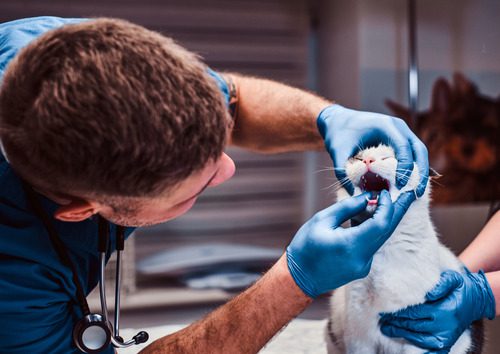How to Keep Your Cat’s Teeth Clean
Many cat owners focus on nutrition, grooming, and regular vet visits, but dental health is often overlooked. Poor oral hygiene can lead to painful dental disease, bad breath, and even systemic health issues. Cats are experts at hiding discomfort, so dental problems may go unnoticed until they become severe. By making cat dental care a priority, you can help your feline companion maintain a healthy mouth and avoid costly treatments in the future. At 441 Animal Hospital in Boca Raton, we prioritize pet dental care for cats, including professional teeth cleaning. If you suspect your cat requires a comprehensive teeth cleaning, call us at (561) 482-5600 to schedule an appointment today.

Signs Your Cat Needs Dental Care
Understanding the signs of dental disease can help you take action before the condition worsens. Common symptoms include:
- Bad breath (halitosis)
- Drooling more than usual
- Difficulty eating or a sudden change in appetite
- Swollen or bleeding gums
- Yellow or brown tartar buildup on teeth
- Pawing at the mouth or face
- Weight loss due to pain while eating
If you notice any of these symptoms, a veterinary visit is essential. Regular checkups and professional cleanings are key components of cat dental care, ensuring that any issues are caught early.
Professional Dental Cleanings for Cats
Routine veterinary dental cleanings are the most effective way to manage plaque and tartar buildup. During a professional cleaning, your veterinarian will:
- Perform a thorough oral exam – Checking for gum disease, loose teeth, or other abnormalities.
- Conduct dental X-rays – Identifying underlying issues that are not visible on the surface.
- Remove plaque and tartar – Using specialized tools to clean both above and below the gumline.
- Polish the teeth – Smoothing the enamel to reduce future plaque buildup.
- Extract damaged teeth if necessary – Addressing severe dental disease that could cause pain or infection.
Brushing Your Cat’s Teeth at Home
Brushing your cat’s teeth is one of the best ways to prevent plaque and tartar buildup. While it may take time for your cat to adjust, establishing a routine can make a significant difference.
- Introduce your cat to the process by letting them sniff and taste pet-safe toothpaste.
- Use the right tools. A soft-bristled toothbrush or a finger brush designed for cats works best.
- Pick a calm part of the day when your cat is relaxed.
- Begin by gently rubbing their gums with your finger, then progress to using the toothbrush.
- Cats naturally clean the inside surfaces with their tongue, so focus on the outside of their teeth.
- Positive reinforcement, such as treats or extra affection, can help your cat associate brushing with a good experience.
Alternative Ways to Support Your Cat’s Oral Health
While brushing is ideal, some cats may not tolerate it. Fortunately, there are other ways to support their dental health.
Dental Treats and Chews
Specialized dental treats help reduce plaque and tartar while giving your cat a tasty reward. Look for products approved by the Veterinary Oral Health Council (VOHC) for maximum effectiveness.
Prescription Dental Diets
Some veterinary diets are designed to promote better oral health. These foods have a unique texture that helps mechanically clean the teeth while your cat chews.
Water Additives and Oral Rinses
Water additives and oral rinses are easy-to-use options that can freshen your cat’s breath and slow down plaque buildup. They can be a great addition to a well-rounded cat dental care routine.
The Impact of Poor Dental Hygiene on Your Cat’s Overall Health
Dental disease in cats does more than cause bad breath and discomfort—it can lead to serious health complications. Bacteria from the mouth can enter the bloodstream, potentially affecting vital organs such as the heart, kidneys, and liver. Untreated dental disease has been linked to:
- Periodontal disease – Inflammation and infection of the gums leading to tooth loss.
- Tooth resorption – A painful condition where a cat’s body breaks down the structure of its teeth.
- Chronic pain – Making it difficult for your cat to eat, groom, and enjoy daily activities.
- Increased risk of systemic illness – As bacteria spread throughout the body, they can contribute to serious organ damage.
How Often Should You Prioritize Cat Dental Care?
Consistency is key when it comes to maintaining your cat’s oral health. Incorporate dental care into your routine with these recommendations:
- Daily or at least 3-4 times per week – Brushing your cat’s teeth.
- Weekly – Checking for signs of dental issues, such as redness, swelling, or bad breath.
- Monthly – Providing dental treats or chew toys.
- Annually – Scheduling a professional dental exam and cleaning with your veterinarian.
A proactive approach to cat dental care makes all the difference in your pet’s overall well-being. If your cat hasn’t had a dental checkup recently or is showing signs of dental issues, 441 Animal Hospital in Boca Raton, FL, is here to help. Our veterinary team offers professional dental cleanings and guidance on at-home care to keep your cat’s teeth in top shape. Call us today at (561) 482-5600 to schedule an appointment.